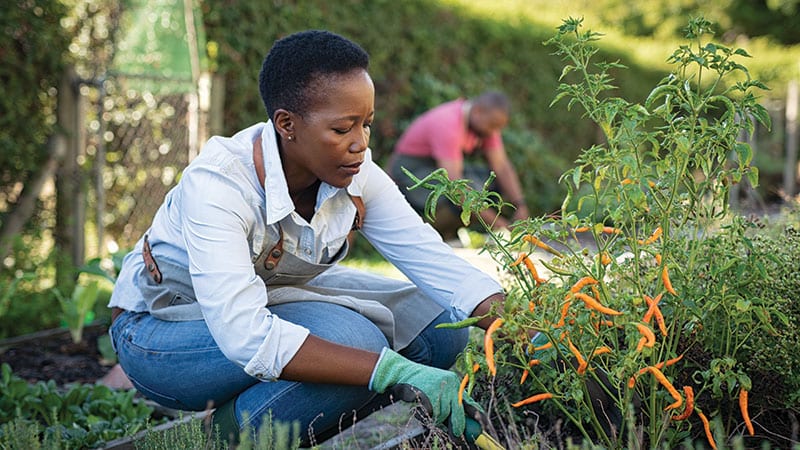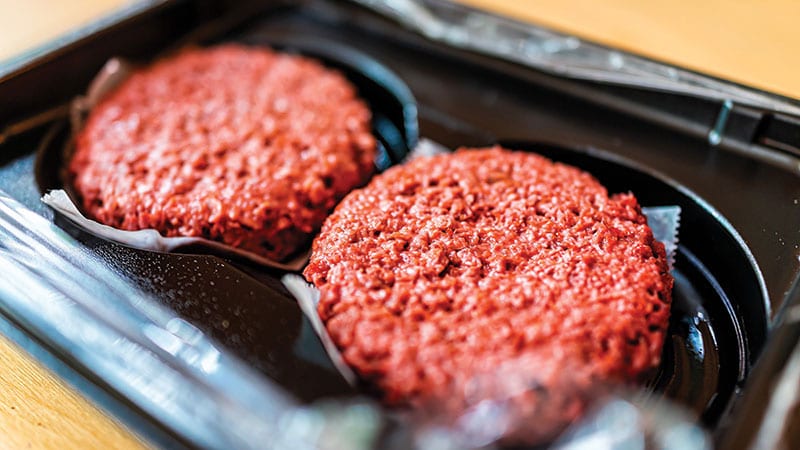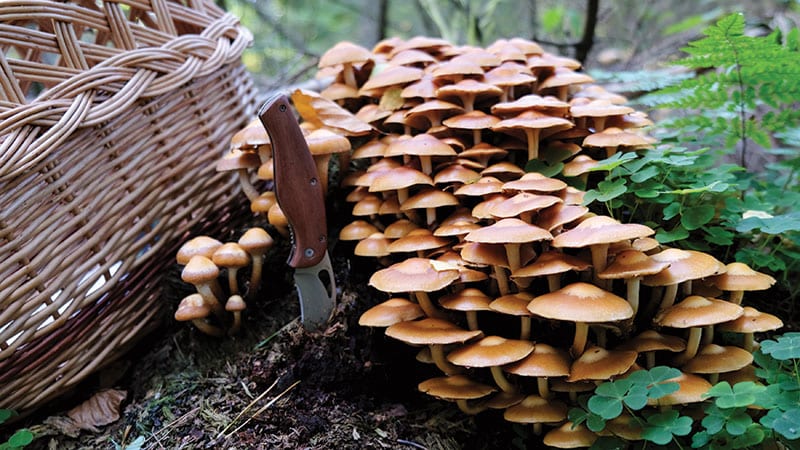News bites
This article was originally published in July 2021

Expanding BIPOC farm
King County has partnered with the Black Farmers Collective to assist in expanding their farm operation, Small Axe Farm, on property in the Sammamish Valley, to grow more healthy and nutritious food. The Black Farmers Collective is a Black-led mutual aid network of BIPOC farmers, organizers and leaders creating a food system for healthier communities. Their three sites, Yes Farm in the Central District, Brown Egg Gardens in Columbia City, and Small Axe in Woodinville are part of their efforts for land acquisition, BIPOC farmer development, community building and educational programs. (KingCountyGreen.com)
Natural blue food color
A pigment found in red cabbage could be used to make a long-lasting and stable natural blue color for food, according to new research published in the Science Advances journal. While many food companies have been moving toward natural colors, finding a natural replacement for blue has been particularly challenging. According to an emailed statement from Mars Wrigley Senior Principal Scientist Rebecca Robbins, the team that published the report has been doing this research for more than a decade. (FoodDive.com)
Prickly pear fuel
Researchers from the University of Nevada, Reno believe the cactus pear, with its high heat tolerance and low water use, may be able to provide fuel and food in places that previously haven’t been able to grow much in the way of sustainable crops. Results of their study showed that Opuntia ficus-indica (cactus pear) had the highest fruit production while using up to 80% less water than some traditional crops. Funded by the Experiment Station and the U.S. Department of Agriculture’s (USDA) National Institute of Food and Agriculture, their study was also the first U.S. long-term field trial of exploring Opuntia species as a scalable bioenergy feedstock to replace fossil fuel. (UNR.edu)
Local food facility?
King County contracted with ECONorthwest to complete an assessment and business concept for a multipurpose shared local food facility that would provide cold and dry storage, food processing infrastructure, and serve as a distribution hub for small food and farm businesses and nonprofit organizations working in the food access and food recovery sector. This first phase project was completed in late 2020; it helped illustrate viability of a local food facility in the Seattle area. The study is an important next step in the development of this much needed infrastructure that has the potential to have wide-ranging benefits including economic development, food waste reduction, job training, food access and community development. (Kingcounty.gov)
GMO crops
More than 90% of all corn, cotton and soybeans planted in the U.S. are genetically engineered, according to data from USDA. The number of crops modified to be herbicide-tolerant and insect-resistant has increased dramatically since 2000, when a quarter of corn planted was genetically engineered. Now, 20 years later, about 92% of corn planted is genetically modified. (InvestigateMidwest.org)
Food Waste Action Plan
Several organizations have banded together to release the U.S. Food Loss & Waste Policy Action Plan, which calls on the Biden administration and Congress to take more action when it comes to fighting food waste. ReFed, the World Wildlife Fund, the Natural Resources Defense Council (NRDC), and Harvard Food Law and Policy Clinic (FLPC) are founding supporters of the new plan. Between 30-40% of all food produced is lost or wasted, with $408 billion spent in the U.S. alone to grow, process, transport and store food that is never consumed, according to an email from ReFed sent to The Spoon. (TheSpoon.tech)
Cereal lawsuit settlement
The popular cereal company Post Consumer Brands, maker of Raisin Bran, Bran Flakes and Great Grains, settled a $15 million lawsuit for misleading health claims, reported Food Dive. As part of its agreement, Post will no longer use the terms “no high fructose corn syrup,” “less processed,” “wholesome,” “smart,” and “nutritious” on breakfast cereals with 10% or more of their calories derived from sugar. People who purchased certain cereals between 2012 and 2020 may qualify for a payout from the company’s $15 million fund. (TheCounter.org)
Microplastics testing
California is poised to issue the world’s first guidelines for microplastics in drinking water despite no data on how plentiful they are in the state, no scientific agreement on how to test water for them and little research on their health risks. The pieces of plastic—smaller than an ant, some so tiny they can be seen only with a microscope—have contaminated wildlife and human bodies through their food, air and water. Under a 2018 state law, California must require four years of testing for microplastics in drinking water, and the state must consider guidelines to help water providers and consumers determine what levels may be safe to drink: Now the state Water Resources Control Board is blazing a trail to issue a preliminary health-based threshold and testing methods by July 1. (TheCounter.org)

Reaching “peak meat”
Within the next decade, meat alternatives are likely to capture so much of the market that North America will reach “peak meat,” and the consumption of animal protein will start to decline. A new report from Boston Consulting Group and Blue Horizon, an impact investor focused on alternative protein, predicts that we could reach peak meat by 2030, and with more regulatory support, it could happen as early as 2025. The same could happen in Europe. (FastCompany.com)
Jovial Foods CEO
Carla Bartolucci, 53, co-founder and CEO of Jovial Foods and Bionaturae, passed away May 22 at her home in Italy. Bartolucci launched Jovial Foods in 2010, after having worked in the organic food sector in the United States and Italy for over 20 years. A Connecticut native who grew up in an Italian-American family passionate about food and farming, she was driven by the desire to find delicious and nutritious options for her daughter who suffered from a gluten sensitivity, without compromising flavor for health. (SpecialtyFood.com)
Climate change lobbying
According to a new study out of New York University, (meat and dairy companies) have spent millions of dollars lobbying against climate policies and funding dubious research that tries to blur the links between animal agriculture and our climate emergency. The biggest link is that about 14% of global greenhouse gas emissions come from meat and dairy. “U.S. beef and dairy companies appear to act collectively in ways similar to the fossil fuel industry, which built an extensive climate change countermovement,” write the authors of the study, published in the journal Climatic Change. (Vox.com)

Premium coffee shortage
The world was already set for a shortfall of the arabica beans used in espressos and lattes this year because of a drought in Brazil, the biggest producer. Then shipping snags started wreaking havoc on supplies. Now, torrential rains are threatening crops in Colombia, the second-biggest grower. (Bloomberg.com)
Reusable coffee cups
Starbucks has announced that it will eliminate disposable cups from its South Korean stores by 2025. Single-use cups will be replaced by a “cup circularity program,” where customers will pay a small deposit for each reusable cup, which will be refunded when they return the cup at a contactless kiosk. The program would be a first for the company and is a part of its campaign to halve its carbon, water and waste footprints by 2030. (Grist.org)
Plum Organics sold
Campbell Soup said it will sell its Plum Organics brand to Sun-Maid Growers of California for an undisclosed amount, the companies said in a statement. Plum, which makes organic baby food and kids’ snacks, was purchased by Campbell Soup in 2013. In recent years, the soup maker has refocused its operations on its packaged food business, exiting an earlier move into fresh foods that proved to be costly and challenging. (FoodDive.com)
Honoring berry breeder
Chad E. Finn, a former plant geneticist at the ARS Horticultural Crops Research Laboratory in Corvallis, Oregon, has been inducted into the Agricultural Research Service (ARS) Science Hall of Fame. Finn, who died in 2019, was posthumously honored for his outstanding and sustained contributions to the advancement of small-fruits crop research. His accomplishments include the development and release or co-release of more than 57 blackberry, raspberry, blueberry and strawberry varieties, some of which have become industry standards generating more than $450 million in fruit and plant sales over the past 10 years. (USDA.gov)

Mushrooming interest
Americans are eating more mushrooms, about 3 pounds per person per year, and consumption has increased each year since 2013. According to Britt Bunyard, the editor-in-chief of Fungi Magazine and director of the Telluride Mushroom Festival, there has been a marked increase in foraging over the past decade—for wild foods, berries, and mushrooms—in general. The pandemic has only exacerbated this interest: Last year, a record number of Americans visited national parks and spent vacation time in the great outdoors, escaping the once-crowded centers of city life. (Vox.com)
